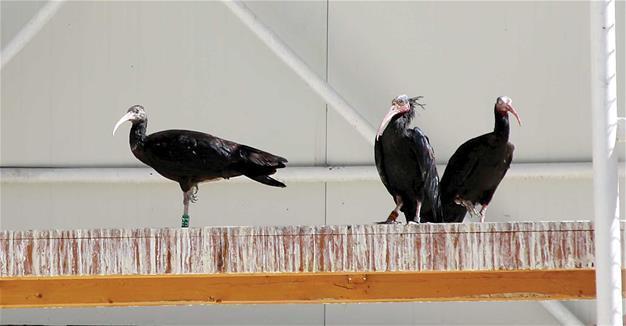Bald ibises to have new homes
ŞANLIURFA

New shelters are being searched for bald ibises, which live only in the southeastern province of Şanlıurfa’s Birecik district in Turkey, in a bid to take them under protection as they are at risk of extinction.
Works have been carried out in the Bald Ibis Reproduction Station, established by the Forestry and Water Affairs Ministry in 1977 for the reproduction of these birds.
Bald ibises are released to their natural environment when the reproduction season starts in the spring months and then taken to cages again in migration season.
Being fed a special menu including non-fat ground meat, boiled eggs, grated carrots and unsalted cheeses, the bald ibises are considered the symbol of abundance by locals in the region.
The number of bald ibises reached 245 this year with 47 newborns and now works have been initiated to establish stations similar to their natural environment. The goal is to protect the birds from being infected by an epidemic disease, disaster or a similar incident.
Speaking to state-run Anadolu Agency, the director of the Nature Protection and National Parks 3rd Region, İsrafil Erdoğan, said the process started in 1977 when two adults and seven cubs were taken under protection, adding that the number of bald ibises increased to 245 right now. “It makes us very happy,” he said.
‘We don’t let them migrate’Erdoğan said they don’t let bald ibises migrate because of the ongoing wars in neighboring Syria and the Middle East on their route.
“In previous years, we were sending the birds to migrate with GPS tools attached on them. This way, they were able to follow them if they could find the migration route. Some of these birds died in Syria or African countries and none of them returned. This year, we are not sending them to migrate because their number in the world is decreasing,” he added.
New reproduction stationsErdoğan said staying in the same environment all the time could negatively affect their natural life, which is why they started producing alternative works to prevent it.
In a new policy by the ministry, Erdoğan said, they were researching different environments for the birds.
“Our experts will examine the habitat in the surrounding provinces and if they are suitable for the life of bald ibises, we will maybe separate some of the birds. We will also establish a production center in new places. This way, we will change the blood. In case of an epidemic disease, we are looking for a new place to reserve some of the birds,” he said.
Erdoğan said the officials working in the station gained more experiences about bald ibises every year and they will continue doing their best to increase the number of bald ibises.
 New shelters are being searched for bald ibises, which live only in the southeastern province of Şanlıurfa’s Birecik district in Turkey, in a bid to take them under protection as they are at risk of extinction.
New shelters are being searched for bald ibises, which live only in the southeastern province of Şanlıurfa’s Birecik district in Turkey, in a bid to take them under protection as they are at risk of extinction.